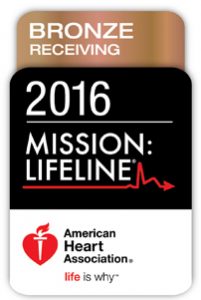Electrophysiology Lab
 On average, your heart beats about 70 times a minute, or more than 2.5 billion times over an average lifetime. Sometimes the heart doesn’t beat the way it should. Irregular heartbeat is called cardiac arrhythmia. An arrhythmia can be a serious, life-threatening event, or it can be an inconvenience that interrupts the activities of daily living.
On average, your heart beats about 70 times a minute, or more than 2.5 billion times over an average lifetime. Sometimes the heart doesn’t beat the way it should. Irregular heartbeat is called cardiac arrhythmia. An arrhythmia can be a serious, life-threatening event, or it can be an inconvenience that interrupts the activities of daily living.
St. Mary’s Electrophysiology Lab can diagnose and treat arrhythmias right here in Athens. Electrophysiology, or EP, is performed in St. Mary’s state-of-the-art dedicated EP Laboratory. Under anesthesia, a special tube called a catheter is inserted into a vein in your leg. Guided by x-ray images and sophisticated computer software, your physician gently maneuvers the catheter into your heart. Once the catheter is inside your heart, the physician can diagnose and often treat the cause of your arrhythmia through a process called ablation. Ablation involves cauterizing the tissue responsible for your condition. Most patients are able to go home the next day. Return to normal activity will depend on your specific diagnosis and treatment.
St. Mary’s has introduced a revolutionary new cardiac device to the Athens area: an implantable pacemaker that can safely function inside an MRI scanner, allowing patients to receive vital diagnostic scanning for conditions ranging from stroke to cancer. These state-of-the-art devices are implanted in the Cardiac Catheterization/Electrophysiology Laboratory at St. Mary’s Hospital. It is estimated that at least 50 percent of patients with implanted cardiac devices will need to undergo an MRI over the lifetime of their device. The MRI-safe pacemakers are a significant step forward in improving patient outcomes.
St. Mary’s comprehensive line of EP services and procedures include:
- Pacemaker and Implantable Cardioverter Defibrillator (ICD) implants, including the new MRI-safe pacemaker
- Holter and event monitoring
- Cardioversion
- Tilt table testing
- Diagnostic EP study
- Catheter ablation of arrhythmia
- Resynchronization therapy for heart failure
Frequently Asked Questions
Heart rhythm and blood circulation are controlled by electrical impulses coming from a natural pacemaker within your heart. Cardiac electrophysiology is the study of the heart’s electrical system, or the electrical impulses that keep your heart pumping.
The term “electrophysiology study” or “EP study” refers to any procedure that requires the insertion of an electrode catheter into the heart. Electrode catheters are long, flexible wires that transmit electrical currents to and from the heart.
Some EP studies are performed to determine the cause, location and treatment of an arrhythmia. Others access the heart for treatment or correction of certain conditions, such as pacemaker or ICD implantation, or cardiac ablations.
Preparations prior to the procedure and follow up upon discharge may differ by physician, patient and situation. Ask your doctor how to prepare for your procedure.
An arrhythmia is an abnormal heart rhythm. The heart may beat too slowly, too rapidly, or in an irregular pattern. The different types of arrhythmias are identified by where they occur in the heart (atria or ventricles) and what happens to the heart's rhythm when they occur. Arrhythmias in the atria are described as atrial or supraventricular. Abnormal rhythms in the ventricles are generally the most serious type of arrhythmias.
Arrythmia symptoms include:
- Palpitations (the feeling like your heart is “running away”)
- Fluttering
- Skipping beats
- Dizziness
- Feeling light-headed
- Fainting
- Pounding in your chest
- Chest discomfort
- Shortness of breath
- Weakness or fatigue
Severe symptoms may be a medical emergency: Call 911 or come to St. Mary's Emergency Center immediately!
Antiarrhythmic Drugs: The initial treatment for an atrial rhythm disorder is with antiarrhythmic drug therapy. These drugs can slow the conduction of rapid heart rhythms and/or convert them to a normal sinus rhythm. Drugs, however, do not cure heart rhythm disorders, and they are not effective in all patients.
Catheter Ablation: Catheter ablation is a non-surgical technique that sometimes offers a cure for patients with heart rhythm abnormalities. This procedure is an option for those patients who are not controlled by medical therapy.
Device Therapy: In a subset of patients with paroxysmal (intermittent) or persistent atrial fibrillation, devices can be used to either prevent atrial fibrillation or convert it to a normal sinus rhythm. These devices include pacemakers and implantable cardioverter defibrillators (ICD).
Blood contains the oxygen and nutrients our cells need to remain functioning, so a strong circulation of blood throughout the body is vitally important to maintaining good health.
Electrical signals from our body's natural pacemaker keep the heart contracting at a healthy pace, which controls the rate of blood that is pumped to nourish and energize the body.
When there is a problem with the heart's electrical system, its pumping power is diminished and blood does not circulate effectively. This can cause irregular heart rhythms and conditions called cardiac arrhythmias.
Care is provided through physician referral. For referral, talk to your physician. For information about EP or St. Mary’s Cardiac Services, call 706-389-3440.
